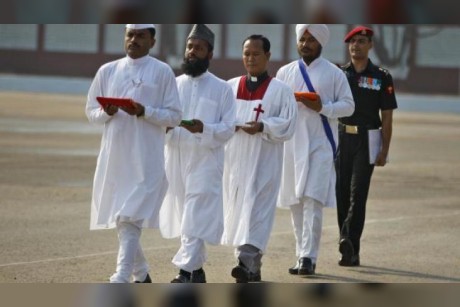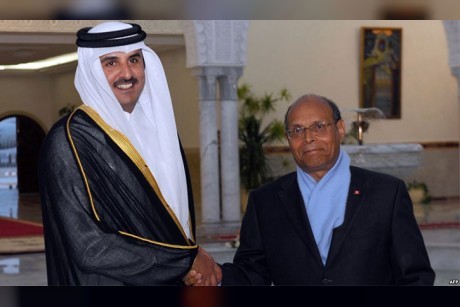Qatari strongman Tamim bin Hamad, like his father, often boasts that his monarchy is an oasis of religious freedom. The problem child lambastes other Gulf countries because they lack the level of tolerance his state enjoys. However, facts, as always, beg to disagree with his words. A report by the US State Department in 2015 slammed Qatar for being very restrictive in dealing with non-Muslims and forcing them to abide by Islamic sharia. Qatar actively regulates and censors any circulating content of any kind to make sure that non-Muslims are not allowed to proselytize. The report has also shown that building Churches, although allowed by law, is a very complicated, tiresome, and convoluted process.
Hindus, Buddhists, Bahais, and other unrecognized religious groups continued to lack authorized facilities in which to practice their religions, said the 2015 report by US State Department's Office of Religious Affairs.
The law recognizes only Islam, Christianity, and Judaism; non-Abrahamic religious groups had no legal mechanism to register or establish official houses of worship. The law provides for prison sentences for blasphemy against Islam, Christianity, or Judaism and criminalizes proselytizing on behalf of any religion other than Islam.
However, some privately owned newspapers continued to publish anti-Semitic political cartoons.
Conversion to another religion from Islam is defined by the law as apostasy and is a capital offense and the law provides for a prison sentence of up to seven years for defaming, desecrating, or committing blasphemy against Islam, Christianity, or Judaism. The law stipulates a one-year prison term or a fine of 1,000 Qatari riyals (QR) ($275) for producing or circulating material containing slogans, images, or symbols defaming these three religions. The law also prohibits publication of texts provoking social discord or religious strife, with a potential punishment of up to six months in prison.
Unregistered churches are illegal, according to the law, as is the practice of non-Abrahamic faiths. Unregistered groups may be disbanded and their members may be deported. The law restricts public worship. It prohibits non-Muslim religious groups from displaying religious symbols, which includes banning Christian congregations from advertising religious services or placing crosses outdoors where they are visible to the public. The law criminalizes proselytizing on behalf of an organization, society, or foundation of any religion other than Islam and provides for punishments of up to 10 years in prison.
The law calls for two years’ imprisonment and a fine of QR 10,000 ($2,746) for possession of written or recorded materials or items that support or promote missionary activity. The government regulates the publication, importation, and distribution of all religious books and materials.
The unified court system applies sharia in family law cases, including those related to inheritance, marriage, divorce, and child custody, and while a non-Muslim woman is not required by law to convert to Islam when marrying a Muslim, the law considers offspring of such a marriage to be Muslims, and non-Muslims are subject to sharia in cases of child custody.
Islamic instruction is compulsory for Muslims attending state-sponsored schools.
In matters involving religious issues, judges have discretion to apply either Shia or Sunni legal interpretations depending on the affiliation of the parties in the case. There are certain criminal cases, such as drunkenness, in which Muslims are tried and punished under sharia. Muslim convicts may earn a sentence reduction of a few months by memorizing the Quran while imprisoned.
Government Practices New religious groups, especially small groups, said they continued to have difficulties gaining or maintaining registration, particularly because of the requirement a group demonstrate it had over 1,500 members, and because of bureaucratic inefficiencies in the MFA. Religious leaders stated the inability to register made it difficult for religious groups to conduct financial activity. The government continued to bar non-Abrahamic religious groups from registering.
According to representatives of religious groups, the government maintained its view of members of religious groups other than Islam, Christianity, and Judaism as transient members of the community not requiring permanent religious clergy or facilities.
The government issues a decree during Ramadan describing its view on the correct way for individuals to perform their religious duties as Muslims.
While the government maintained its policy of reviewing foreign newspapers, magazines, and books for “objectionable” religious content, journalists and publishers reportedly continued to practice self-censorship regarding material the government could consider hostile to Islam. Sources said the Ministry of Culture and the Ministry of Endowments and Islamic Affairs continued to censor or ban texts on Shia Islam.
Church leaders and other religious groups said online commentators practiced selfcensorship and relied instead on word of mouth and email newsletters to distribute information. While proselytizing remained punishable by up to five years in prison, the government’s policy continued to be to deport foreigners suspected of proselytizing without formal legal proceedings. Church leaders stated their ability to collect and distribute funds for charity continued to be limited by the government’s restrictions on the number and type of bank accounts churches could hold, as well as reporting requirements on contractors doing business with the churches and on donors.
Almost all citizens (approximately 90 percent according to estimates) are Sunni Muslims, with almost all of the remaining portion Shia Muslims. The breakdown of the noncitizen population between Sunni, Shia, and other Muslim groups is not available. Estimates of the noncitizen Hindu, Christian, and Buddhist communities are provided by Christian groups and local embassies. The Hindu community, almost exclusively from India and Nepal, comprises approximately 30 percent of the total population. Roman Catholics make up approximately 18 percent of the total population, while Buddhists, largely from South, Southeast, and East Asia, account for approximately 6 percent of the total population. Groups constituting approximately 5 percent of the total population include Anglicans, Egyptian Copts, Bahais of Iranian or Lebanese origin, and members of the Greek and other Eastern Orthodox Churches.



